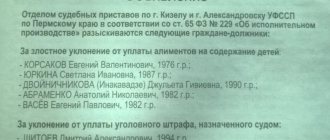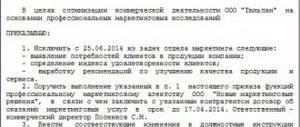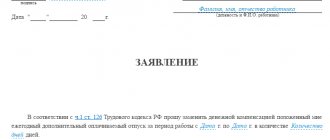Free legal consultation over the Internet 24 hoursLawyer on housing issues in St. Petersburg. Free legal consultation on labor disputes.
5/5 (2)
What it is
Restriction of the right to drive a vehicle for debts includes the suspension of a driver's license, which is carried out by a bailiff regarding citizens who are debtors on the basis of writs of execution.
The legislator considers the suspension of a driver's license as a restriction of a special right.
Its meaning is that the debtor has no right to drive a vehicle until he liquidates the existing debt.
Remember! Restriction of a driver's license does not imply the confiscation of the corresponding license, however, if the debtor is stopped by a traffic police inspector, he will see information about the ban on driving a vehicle in the database.
In this case, the traffic police officer has the right to draw up a protocol on the administrative offense and submit it to the court to impose punishment on the violator.
Suspension of use of a driver's license
Changes to the law expanded the powers of bailiffs, including the use of restrictive measures in case of non-payment of alimony. Now the bailiff deprives the debtor of the right to drive a personal car, moped, motorcycle, tricycle, quad bike, air and water transport.
Before issuing a decision to apply the restriction, the bailiff notifies the defaulter about this measure and gives time for voluntary repayment of the debt (five days). Thus, the alimony recipient has the opportunity to prevent restrictions on his rights to drive a car by paying off the debt.
The bailiff issues a decision to suspend the validity of the license if the following conditions are met:
- There is a court decision (ruling, order) on the forced collection of alimony or debt. If there is another document (agreement) on the payment of alimony, such a restriction through the FSSP does not apply.
- There is a deliberate evasion of the debtor from fulfilling obligations.
- The amount of debt under one or more court orders (writs of execution) exceeds ten thousand rubles. In addition to alimony debt, this includes compensation for damage in criminal cases, outstanding fines for traffic violations, etc.
- There are no circumstances preventing the application of such a measure.
The resolution is brought to the attention of the debtor, and the responsibility for violating the prohibition is explained to him. Copies of the document are transferred to the claimant and the state. to the authority that issued the license (State Traffic Safety Inspectorate), the driver's license - to the bailiff for safekeeping. You can pick it up only after the decision is canceled.
If the debtor did not respond to the warning and did not hand over the certificate to the bailiff for safekeeping, the restriction on the right to drive applies even though the driver’s license is actually in the hands of the child support provider.
If the ban on driving is ignored, the debtor faces correctional labor (50 hours) or deprivation of driving license through the court for a period of 12 months. If a traffic police officer checks the documents of such a driver and sees information about the current restriction in the traffic police database, the license will be confiscated. USEFUL INFORMATION: Application for a court order for alimony, sample
Legislative basis
The procedure for restricting a driver's license for debts is regulated by the following regulations:
- Law of November 28, 2015 No. 340-FZ. The right to restrict a driver's license for debts was first granted to bailiffs by this law;
- Law “On Enforcement Proceedings” No. 229-FZ. This regulatory legal act amended the above law. This happened by adding Article 67.1, which gives the FSSP employee, at his own discretion, to make decisions to restrict driving licenses for debtors who do not want to fulfill their financial obligations on the basis of judicial acts. The changes also affected other articles of the Federal Law dated November 28, 2015;
- Code of the Russian Federation on Administrative Offences. The amendments also affected this legislative act, which was supplemented with Article 17.17. This article establishes the procedure for liability of a person who has violated the requirements for restricting a driver’s license;
- Law No. 196-FZ. After the adoption of the Federal Law of November 28, 2015, this regulatory act was supplemented with a provision on the possibility of limiting the debtor’s right to drive a vehicle.
Next, we should look at the purpose for which the above amendments were made and how effective they are.
Objectives of the intervention
The provisions of Law No. 340-FZ, which grants the right to restrict the right to drive a vehicle, came into force in January 2021.
The main task of this legal act is to influence citizens who do not want to pay off their debts.
The initiators of the introduction of this measure were traffic police officers. This is due to the fact that many fines imposed for non-compliance with traffic rules were not paid by drivers, despite their ability to repay the debt.
READ ALSO: Lawyer for driver's license return.
This proposal was also supported by FSSP employees, especially since similar ideas had already been put forward earlier. Already in 2009, bailiffs became familiar with foreign experience in restricting driving licenses. In many foreign countries, this measure has had positive results for a long time.
Practice shows that restrictions on driving time have a special impact on men who own vehicles, since the loss of the ability to travel by car frightens most of them.
In addition, such a measure of influence contributes to the fulfillment of another important goal - the legalization of income received through the vehicle.
Important! If a person can prove to a FSSP employee that a vehicle is his only source of income, and therefore the ability to drive is necessary, then the specified measure of influence will not be applied.
When a restriction is imposed
The new law applies only to certain groups of debtors. Moreover, the debt of violators must necessarily exceed 10,000 rubles.
Such debtors include:
- alimony debtors;
- citizens evading payment of fines for committing administrative offenses;
- persons who are debtors on the basis of decisions made by courts for compensation for moral or possible material damage. This also includes citizens who, through their actions, caused harm to the health of a certain person.
Loan debtors are not included in this list.
How can a child support worker return lost rights?
In order for the alimony to regain his rights, he will first have to pay off the debt and penalty. If administrative measures have already been applied, in particular a fine for driving without a license, then they also need to be paid. So, the reasons for return are as follows:
- Payment of debt under a writ of execution, late fees, and administrative fines.
- Submitting an application to the court requesting a deferment of payment due to valid reasons (dismissal, illness).
- Presentation of documents with which you can prove that you belong to the preferential category of disabled people.
- Proof that leadership is the only source of sustenance.
If the sanction was imposed on several sheets at once, for example, alimony debts and debt to the budget, then at least one debt must be covered. The main thing is that in the end, the amount of obligations should not exceed 10,000 rubles.
Within 2 days after confirmation of payment of debts, the bailiff issues a new resolution, which cancels the sanction. It takes two days to check the information provided and draw up a new document. After which copies of the document are sent to all interested parties. Next, information about the lifting of the restriction is entered into the database and the driver is issued a license.
Which transport does it apply to?
Restriction of a driver's license for debts is possible in relation to various vehicles:
- cars;
- motorcycles, mopeds, quadricycles, tricycles;
- self-propelled machines (tractors, combines, other agricultural machinery);
- water and air vessels.
Restriction of other special rights (for example, to conduct certain activities) is not within the scope of powers of bailiffs.
If a citizen has no debts, then the suspension of the right to drive a vehicle is impossible.
Watch the video. Who will be banned from driving:
How to write an application and its sample
A bailiff can initiate the issuance of a resolution to restrict the right to drive a vehicle on his own initiative. If he does not do this himself, the recipient of the payments can induce him to do so. To do this, he needs to write and submit an application to the responsible executor.
The recipient of payments can submit an application to apply a sectional measure against the debtor to both the FSSP and the court. The second option can be used if the requirements are ignored by the executor and the chief bailiff. Also, an appeal to the court is justified due to the absence of a writ of execution, if there is only a voluntary agreement on the payment of alimony.
A sample application for deprivation of a driver's license for systematic failure to pay child support is presented to our readers for review. If the need arises to submit such a petition, then you can use ready-made examples of applications. Let's look at the composition of the application:
- Applicant details, including:
- FULL NAME;
- address;
- telephone contact details.
- Name of the addressee + full name of the official (if necessary). For example, to the bailiff specifically or to the district court of the city.
- Document's name.
- Information on the writ of execution, agreement (date of acceptance, frequency and amount of payments).
- The number of proceedings that is open to implement the requirements of a court decision or alimony agreement.
- Grounds for applying sanctions. In our case, this means failure to fulfill alimony obligations for a specific period and the formation of a debt amount exceeding 10 thousand rubles.
- Request for restriction of the right to drive a vehicle.
- Date of.
- Signature.
In cases where the situation is of an individual nature and there is an intention to make several demands at once, you should consult a lawyer. Today, many companies and independent lawyers provide it in real time. First legal aid is provided free of charge.
Documentary evidence for the application:
- alimony agreement/court decision to assign appropriate payments;
- a certificate of the amount of debt from the bailiff (if this is an appeal to the court);
- information on the debtor’s employment (if he is employed and can fulfill his obligations).
Submitting an application
To restrict a person’s driver’s license for debts, it is necessary to submit a corresponding application to the local FSSP office. The document is drawn up in the name of the senior bailiff and is presented in two copies.
This application must contain information about the parties (full name, place of residence) and reflect the essence of the requirements.
Photocopies must be attached to the document:
- documentation reflecting the amount of debt;
- court decisions;
- the decision made against the debtor;
- other documents proving the legitimacy of the claims.
The FSSP employee must register this application by placing an acceptance mark on the copy of the person who applied.
ATTENTION! Look at the completed sample application to the FSSP for a temporary restriction on the debtor’s use of a special right:
How to restrict alimony payment on a driver’s license: algorithm of actions
The procedure for revoking a driver's license for non-payment is standard. The formation of debt is the basis for imposing a sanction. It can be implemented only after missing the five-day deadline, which is allotted for voluntary debt settlement. The countdown of the period begins from the moment the decree is served, in which the debtor is warned about the future consequences.
For reference!
Payment of alimony is made on the basis of a court decision or agreement of the parties. Each of the documents serves as the basis for opening proceedings.
The procedure for deprivation is as follows:
- Initiation of revocation of driver's license. There are two options:
- When there is an agreement, the obligations under which are ignored by the payer, the recipient himself goes to court with a corresponding application.
- The presence of a writ of execution, the obligations under which have not been fulfilled, gives the bailiff the right to independently implement restrictions.
- Warning the debtor about the need to cover the debt and the occurrence of negative consequences for him if the requirements are ignored. Any of the following methods can be used for warning:
- SMS sending;
- registered letter by mail;
- telephone mode.
- Formation of the text of the resolution.
- Approval of the document by the senior bailiff.
- Sending copies of the resolution to all interested parties:
- debtor;
- recipient of alimony;
- State Traffic Safety Inspectorate/Ministry of Internal Affairs, another department responsible for the actual restriction of special rights.
- Transfer of the certificate by the fine officer to the FSSP until the requirements are met.
- Application of penalties for ignoring instructions.
A copy of the resolution must be submitted to the traffic police department. Information about the collection, stored in a common database, allows all guards to monitor the implementation of the order. For driving a vehicle, even if you actually have a license, there will be a fine if sanctions apply.
The text of the resolution consists of the following paragraphs:
- information on the driver's license (its number, full name of the owner, date of issue);
- instructions on debt obligations that the payer does not fulfill;
- notification of the consequences that occur in case of non-payment;
- the time frame within which the requirements must be met in order to avoid the imposition of sanctions.
Execution of the procedure
Restriction of a driver's license for debts is carried out in the following order:
- First, enforcement proceedings are initiated. To do this, the bailiff issues a resolution indicating the period within which the person can repay the debt voluntarily;
- Next, information is clarified from the parties about whether the debtor has special rights. An FSSP employee has the right to indicate in the resolution a requirement to provide information regarding the debtor’s property, accounts opened in his name, and information about his driver’s license. If this requirement is not met, the citizen may be subject to a fine. The bailiff can find out information about the driver’s license from the collector or obtain it from government agencies. In this regard, it makes no sense to conceal information about the presence of a territorial license;
- then the FSSP officer issues a decision to restrict the driver’s license. This measure can be prescribed either at the discretion of the bailiff himself or at the written request of the claimant. There is no need to notify the offender. It is also worth noting that the resolution may not contain information about the restriction of driver’s licenses, since this measure is also applicable to those cases that were opened before the moment when Law No. 340-FZ was adopted;
- after this, the FSSP employee notifies the debtor of the measure taken against him. To do this, the citizen must personally familiarize himself with the decision made. This happens by sending the debtor a registered letter with notification or via the Internet. Notifying the debtor is not mandatory only if the citizen is wanted;
- The last step is to restrict the debtor's driver's license. To do this, the bailiff transmits information about the debtor to the traffic police.
Application to the bailiffs for deprivation of the driver's license of the alimony debtor, sample
The appeal to the bailiff contains the following information:
- Applicant details – full name, contacts (address, telephone).
- The structural unit of the service to which the application is submitted.
- Information about the document that served as the basis for initiating proceedings - name, number, details of the debtor.
- Number of enforcement proceedings.
- The grounds for taking a restrictive measure are failure to voluntarily fulfill obligations by the alimony provider.
- Request to establish restrictions on driving a vehicle.
USEFUL INFORMATION: Application for familiarization with the materials of enforcement proceedings, sample
Copies of the court decision and the order to initiate proceedings are attached to the application.
Sample application:
An example can be downloaded:
Expert opinion
If you are not sure that you can correctly draw up an application using the sample yourself or you have an individual case that does not fit the template, then you can contact me directly. All information on how to contact me is on my personal page>>>
When does the restriction come into effect?
The debtor's driver's license is restricted from the moment:
- when the debtor personally familiarized himself with the bailiff's decision. This means that after this the citizen no longer has the right to drive a car, despite the fact that the driver’s license remains with him;
- when the debtor received the letter. If the notice was sent to the person by mail, then the measure begins to take effect when the letter was delivered to the offender himself or a member of his family against signature. It is worth noting that if a citizen changes his place of residence and does not inform the FSSP officer about this, then it will be considered that the citizen was notified in the proper manner (Article 29 of Law No. 229-FZ). Attempts to evade receiving a letter in such a situation will not help: if the debtor is notified of the need to receive a letter, but does not show up for it, then it is considered that he is aware of the extent of the impact;
- when the debtor visited his personal account on the State Services website, if the notice was sent via the Internet.
If a citizen begins to pay off the debt monthly or repays it in full, the restriction on the driver’s license is lifted by the FSSP employee. The bailiff notifies the traffic police authorities about this.
Attention! Our qualified lawyers will assist you free of charge and around the clock on any issues. Find out more here.








